- Print
- DarkLight
- PDF
Reminders and Overdue Notices
Email, text message, and/or print notices to patrons who have resources on loan that are nearly due or overdue. Notices can be generated manually on-demand, or you can set a schedule to have the notices created automatically. There are five different levels of reminders and overdue notices, and you can have different messages and settings for each type.
Sample Printed Notice
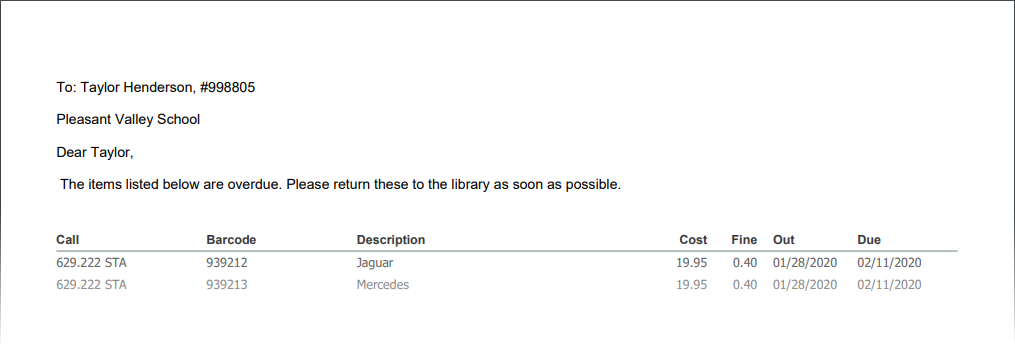
Sample Email Notice
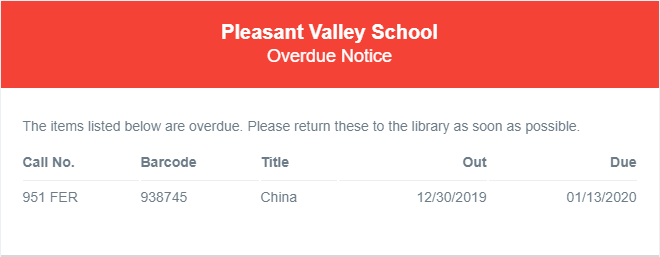
Sample Text Message Notice
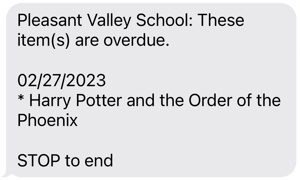
Step 1 - Select or Create Notice Set
The first step is to select which notice set to use. In many cases, you'll have only one, Standard, and can just go to the next step.
Notice sets are helpful when you want to create different types of notices for different segments of your patron population. See Notice Sets and Recent Paper Notices for more about Notice Sets.
Step 2 - Options
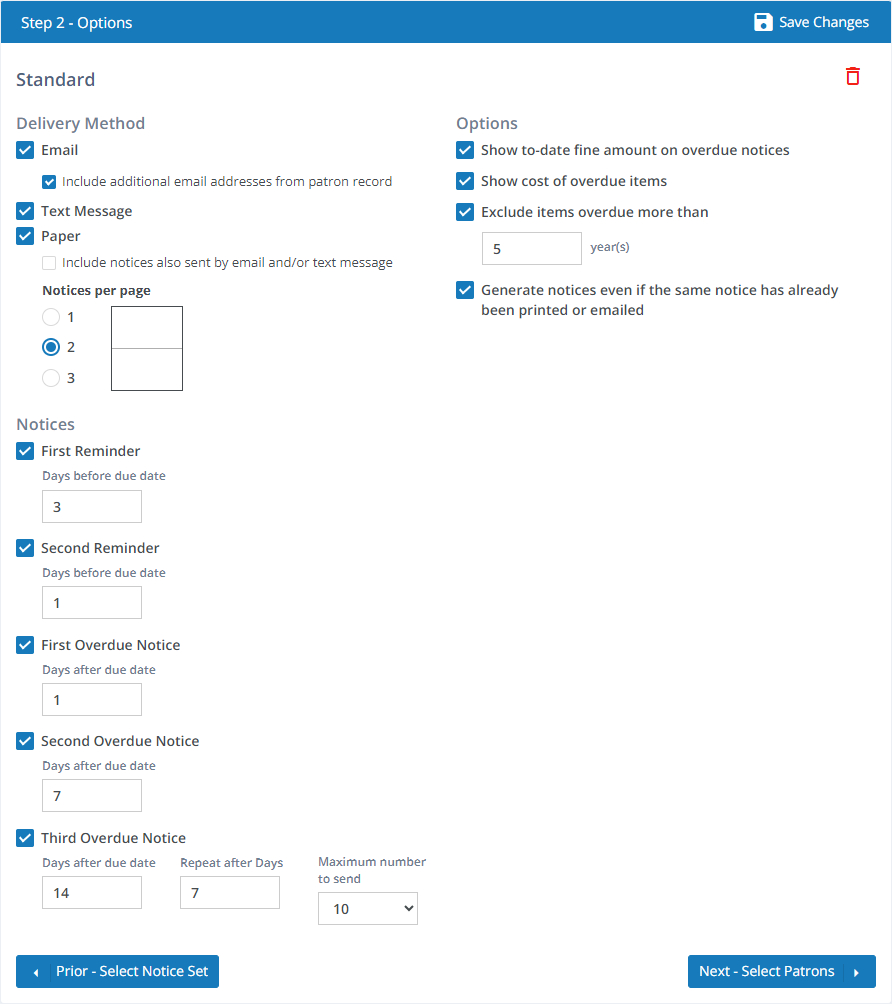
Delivery Method
Email - Send notices by email. When you select this option, notices are sent by email to patrons that have email addresses on file. Email notices are the most convenient because they can be sent on schedule and do not require any staff interaction for printing and delivery.
- Include additional email addresses from patron record - Unless this option is set, email notices will not be created for emails added to the Additional Email for Notices field in a patron profile. Select this option if you want to create email notices for those additional emails.
Text Message - Select this option to send notices by text message. Text messages will be sent to patrons via the mobile phone number on their patron record or to the number listed as their home number if this option is enabled. See Settings : Patrons : Text Messaging. This option requires an optional Surpass Cloud Text Messaging plan. See Sending Notices by Text Message.
Paper - Select this option to print notices on paper. If you do not have email addresses or mobile phone numbers for all of your patrons, you'll want to select this option so you get paper notices for those.
- Include notices also sent by email and/or text message - Unless this option is set, paper notices will not be created for patrons who have email addresses or who are sent text messages. Select this option if you want to create both paper and email notices for those patrons.
- Notices per page - To conserve paper, you can select to print two or three notices on the same sheet of paper, which is then cut after printing. Guidelines are printed to show you where to cut. Select 1, 2, or 3 to indicate the number of notices you want to print on a sheet of paper.
Notices
First Reminder - Check this box if you want to send reminder notices to patrons before the due dates and set the number of days the notices are to be sent prior the due date. Only one First Reminder will be sent to a patron for a resource on loan.
Second Reminder - Check this box if you want to send a second reminder to patrons closer to the due date and set the number of days the notices are to be sent prior to the due date. Only one Second Reminder will be sent to a patron for a resource on loan and only if a First Reminder has already been sent.
First Overdue Notice - Check this box if you want to send a first overdue notice to patrons and set the number of days the notices are sent after the due date. Only one First Overdue notice will be sent for an overdue resource.
Second Overdue Notice - Check this box if you want to send a second overdue notice to patrons and set the number of days the notices are sent after the due date. Only one Second Overdue notice will be sent for an overdue resource and only if a First Overdue Notice has been sent.
Third Overdue Notice - Check this box if you want to send a third (and beyond) overdue notice to patrons and set the number of days the notices are sent after the due date. Third Overdue notices are sent only if a Second Overdue Notice has been sent. Unlike other notices, Third Overdue notices can be sent repeatedly for overdue resources, so you also set the Repeat after Days and Maximum number to send.
Options
Show to-date fine amount on overdue notices - Set this if you want to show the amount of the fine that would be charged if it were returned on the date the notice is created.
Show cost of overdue items - If checked, the acquisition cost (if known) will be included in the notice.
Exclude items overdue more than ____ years - Use this option to exclude extremely overdue loans.
Generate notices even if the same notice has already been printed or emailed - Check this option if you want to re-create notices even if they have already been sent. This option is available only if you are creating notices on demand; not if you are creating notices automatically on a schedule.

It is not necessary to click the Save Changes button as you move from one step to another. Your changes are saved automatically when you go to the next step. The Save Changes button is useful when you don't need or want to go to the next step but just want to set up a schedule and/or make some changes and leave.
Step 3 - Select Patrons
The next step is to select which patrons you want to receive notices, using either Basic or Advanced record selection options. See Selecting Records for Patron Reports for detailed instructions.
In most cases, just select All Patrons and skip forward to the next step. You don't need to do anything special to create notices only for patrons who have items that are due soon or overdue. Surpass Cloud will handle all of that for you.
You will use this when you want to include or exclude certain patron types from receiving notices. This is most useful when you are creating multiple Notice Sets to tailor the language and options for the notices to different segments of your patrons.
Step 4 - Notice Text
This is where you can customize the text that appears at the top of every reminder and overdue notice.
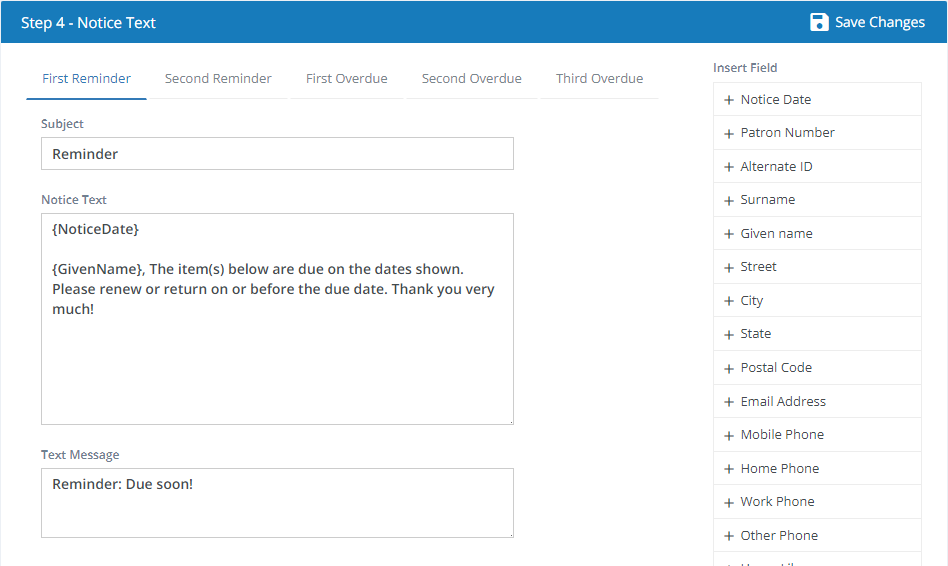
Use the tabs across the top to see and edit the text of the different variations of Reminders and Overdue Notices: First Reminder, Second Reminder, First Overdue, Second Overdue, and Third Overdue.
Subject - The subject heading to be used for emailed notices.
Notice Text - The text of the notice when emailed or printed. Enter the text you want to appear above the list of due-soon or overdue items. Click patron fields from the list on the right side of the page to insert placeholders for patron data that will be filled in when the notice is created.
Text Message - The text of the notice when it is sent as a text message. Because this is sent via text message, it should be short and to-the-point.
The header with patron name, number, etc. that is printed at the top of all printed notices can be edited in Settings : Patrons : Notices. You do not need to include that here. If you mail notices, you will likely want to include the mailing address on the printed notice header so it can appear in a window envelope.
Inserting Patron Fields
While editing the text, move your cursor to the place where you want to include a patron field then click the corresponding field from the list on the right side of the page. You can remove a field from the text by simply deleting it or typing over it as you would any text.
{Surname} means the patron's surname (last name) will appear in this place. If you make any changes to these placeholders, Surpass Cloud will no longer recognize them and will print them in the notice text verbatim.You can also edit notice text on the Settings : Patrons : Notices page.
Step 5 - Schedule
The most convenient method for handling reminder and overdue notices is to have Surpass Cloud create them for you automatically on the day(s) of the week you select. Of course, you can also opt to email and/or print them manually regardless of whether you have them set to be created on schedule.
- Create notices automatically - Check this box if you want notices to be created automatically, then check the boxes next to the day(s) of the week you want to create notices. The notices will be created sometime between midnight and 5:00 AM on those days. Emailed notices are sent at that time and paper notices are created and saved so that you can print and deliver them at your convenience.
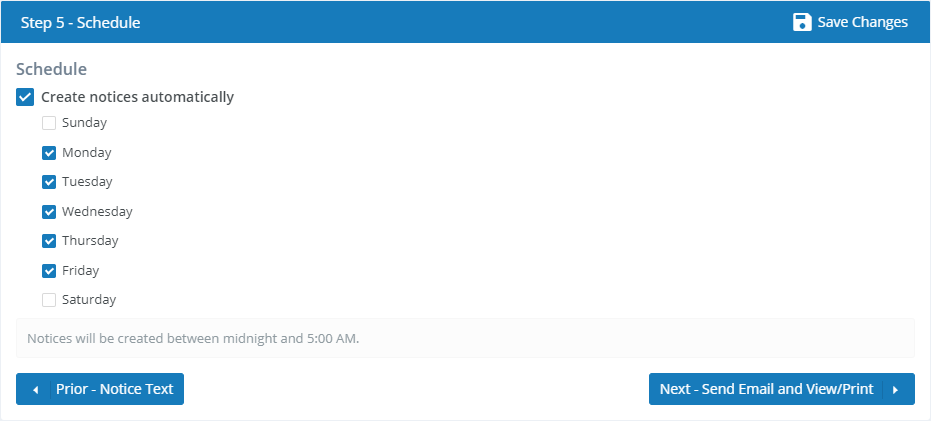
If you have selected to create notices automatically according to schedule, you don't need to go to the next step unless you want to also create notices immediately. Just click the Save Changes button to save your schedule and go on your way. The notices will be created on the day(s) you selected. Later, you'll find the paper notices (if any) listed on this page for you to download or print, listed under Recent Paper Notices. These notices will be available here for 7 days.

Step 6 - Send Email and View/Print
If you are creating notices immediately instead of on a schedule, there is one more step: sending email and/or viewing and printing notices. The functioning of this step depends on which delivery method(s) you selected in Step 1.
If your notices include paper notices, they will appear in a preview window. The report can be viewed on-screen, printed, or downloaded as a PDF. See Viewing and Printing Reports.
If you had any notices to email, you'll receive information about the number of notices queued for delivery.
All notices sent by email or paper are recorded in the Notice History panel on the Patrons : View page.
If your library is part of a system that has multiple locations or branches, the notices will be sent for resources belonging to the selected location only, regardless of whether you have the All Locations option selected.



